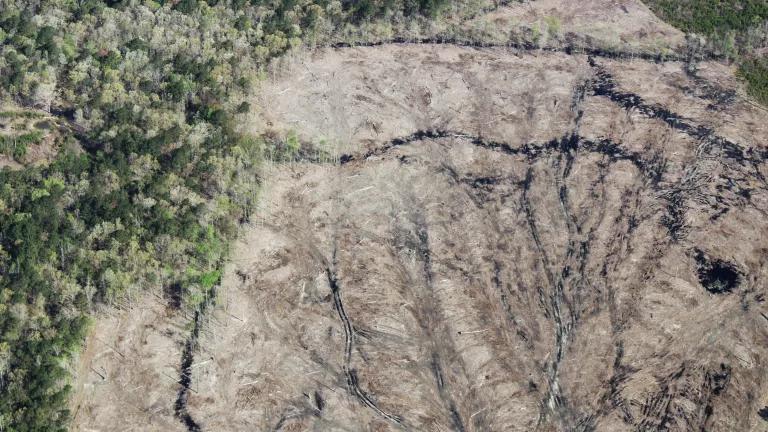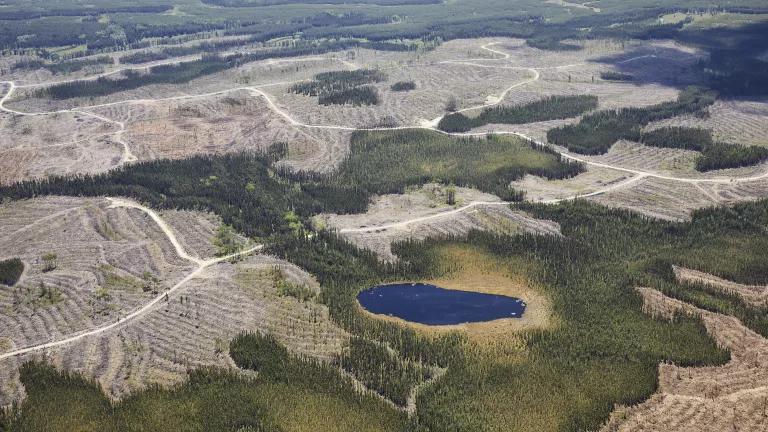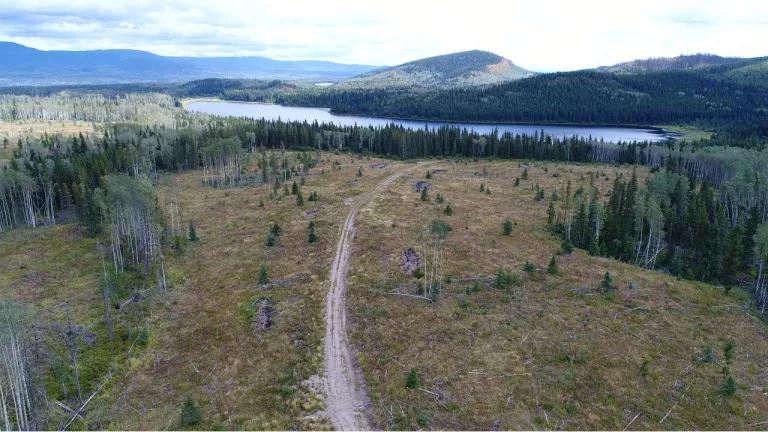What Does the Glasgow Declaration Mean for Biomass?
In a key moment at COP26, over one hundred countries signed the Glasgow Declaration at COP26, which aims to halt and reverse forest loss and land degradation by 2030.

A clearcut to produce biomass wood pellets at Enviva in Northampton, North Carolina
In a key moment at COP26, over one hundred countries signed the Glasgow Declaration at COP26, which aims to halt and reverse forest loss and land degradation by 2030.
While the Declaration recognizes the vital role of forests in combating climate change, it leaves out big pieces that are critical to protecting them. One of the most glaring deficiencies is the Declaration’s failure to fully address logging forests for wood products, including to manufacture wood pellets for biomass energy.
Because biomass energy is misleadingly treated as “zero carbon” at the point of combustion—for example at the smokestack of a large power station—countries are increasingly turning to this harmful energy source to notionally meet their climate goals. This is despite the fact that scientists tell us that burning biomass from forests makes climate change worse and these damaging policies must be urgently reformed. As such, the Glasgow Declaration should have tackled this issue head on to protect our planet’s forests. Instead, it missed a critical opportunity to close the biomass loophole.
That's because the Declaration focuses primarily on “deforestation,” which refers to the permanent loss of forests when land is converted to another use (e.g., agriculture, development). This term largely exempts logging for biomass because trees are assumed to be eventually regrown (replanted or grown back naturally), even though the logged forests—and their value for the climate and biodiversity—are essentially irreplaceable. By using this term ("deforestation"), the Declaration also largely exempts the Global North for its own forest clearcutting in some of the world’s most climate-critical forests in the Global North, which includes logging for biomass.
This is bogus. Replacing complex, carbon-rich natural forests with industrial tree plantations and/or saplings that take years to regrow creates a completely different ecosystem, harming the biodiversity that once lived in the forest and decimating its carbon storage capacity. Trees may be renewable, but forests are not.
Logging forests to create wood pellets to burn for biomass energy is laying waste to forests around the world—from the U.S. Southeast to Canada’s carbon-rich forests to nature reserves in the Baltics. While industry claims to use only the byproducts of logging for wood pellets (which they refer to as “wastes and residues”), whole trees are routinely logged and made into wood pellets that supply Drax and other large biomass power stations, destroying ecosystems and eroding the carbon sinks the world needs to avert climate catastrophe.
The UK, in particular, is driving this problem as the world’s top importer and subsidiser of biomass energy. And yet, despite signaling no intent to change their practices, the UK—and other countries subsidising the burning of trees for industrial-scale biomass energy production with billions of pounds a year—have signed onto this declaration.
Meaningful global process under the Declaration requires signatories to immediately end subsidies to large energy companies that burn forest biomass. Countries where logging is occurring—particularly those with the highest global rates of primary forest loss like Canada, the U.S., and Russia—must put plans in place to actually protect their forests. Signatories should also act upon the parts of the Declaration that can, if scrupulously implemented in alignment with scientific consensus, hold countries accountable for their biomass consumption and/or production. For example, signatories commit to "[f]acilitate the alignment of financial flows with international goals to reverse forest loss and degradation” and to “transition to an economy that is resilient and advances forest, sustainable land use, biodiversity and climate goals," suggesting that they must redirect subsidies away from damaging biomass electricity—and towards true renewables like wind and solar in the UK and elsewhere. The Declaration also commits to “[c]onserve forests and other terrestrial ecosystems and accelerate their restoration,” which runs counter to subsidising biomass energy and allowing forests to be logged for biomass energy.
Like every other international agreement, the Glasgow Declaration is non-binding, so it's incumbent on signatories to actually implement it in a meaningful way. The bottom line is that our world’s forests—and the critical carbon stores they provide—will be at serious risk until countries like the UK stop trying to meet climate goals with false solutions like burning forest biomass for electricity. As the world’s leading scientific bodies (see here and here) have made clear, meeting our international climate target requires the protection of forests globally. With the Intergovernmental Panel on Climate Change (IPCC) indicating that we can't avoid the worst consequences of climate change without the carbon storage provided by forests, we need real and immediate solutions to protect forests. This must go hand in hand with ending billions in biomass subsidies in the UK and beyond.




